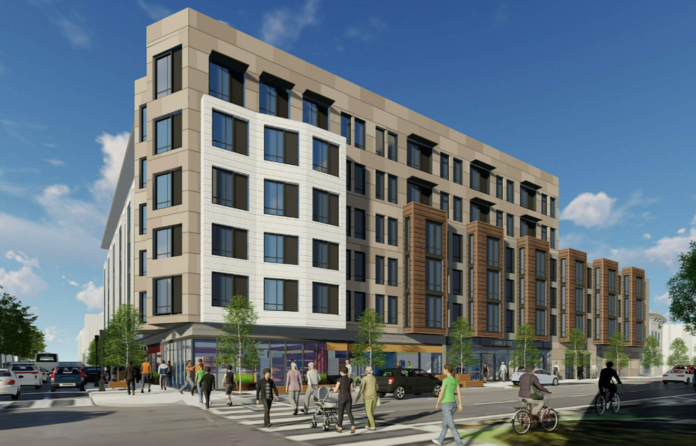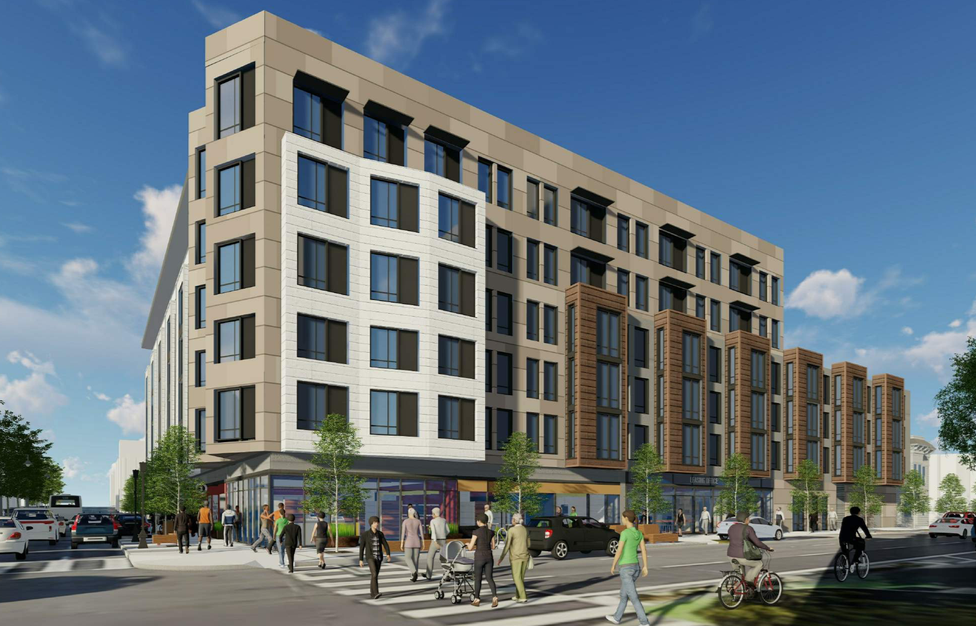
The SF Planning Commission meets Thursday/23 to consider a project on Divisadero and Oak that could become an issue in the heated District Five supervisorial race.
The plan calls for the demolition of a gas station, car wash, and an existing residential building as well as the relocation of another residential building – and the construction of 184 new residential units as well as ground-floor commercial space and 56 parking spaces. The proposal by Genesis Development would include 37 affordable units – the statutory minimum.
It also raises all of the key issues around housing policy that have divided progressives and pro-market “moderates:” How much affordable housing is enough? Should growth pay for growth? Does more luxury housing do anything to address the housing crisis? And if a developer won’t cover the costs of its transit impacts and offers less affordable housing than the city needs, should the city demand more?

Sup. Vallie Brown, who represents the neighborhood, has been working with the developer on relocation, and got the Tenderloin Housing Clinic to represent the existing tenants. THC, according to a May 14, 2019 letter, is currently considering offers that Genesis has given to the tenants. The letter states that “we will continue to keep in close contact with Sup. Brown’s office in order to bring this Project to a good outcome for the community.”
Genesis has offered to temporarily relocate the existing tenants and allow them to move back to rent-controlled apartments.
Brown, of course, can’t take an official position on the project because as an incumbent supe, she might have to vote on an appeal. But J.K. Dineen at the Chron reports that she says the project has “widespread support.”
Indeed, the Planning Commission has received dozens of letters from supporters. Most have virtually identical language, and some were sent from a server with the address wordpress@400divisadero.com. Others include pictures of the supporters posing with developer David Kriozere.
Brown’s challenger, Dean Preston, has a completely different take. He’s opposing the project and demanding that the developer increase dramatically the number of affordable units, guarantee that the project will be constructed with union labor, and require additional transit-impact fees.
I welcome housing at this site, but cannot support this proposal without substantial changes. Put simply, San Francisco can do better for its residents at this location. The project does not provide enough affordable housing, has not committed to using union labor, does not offset its transit impacts, and fails to address the Divisadero Community Plan.
Preston notes that the area was upzoned when Mayor London Breed was the district supervisor:
In 2015, Divisadero was upzoned without meaningful community input. This site was proposed for 51 units of housing before the rezoning, and was amended after the upzoning to more than triple the number of units on the same site. It is now proposed at 184 units. Thanks to the upzoning, the developer’s profits will increase dramatically.
The original rezoning included no increase in the affordability rates or other community benefits. This was astonishing. The community organized to form Affordable Divis and push back on the giveaway, calling for higher affordability rates. Ultimately, due to our pressure, then-Supervisor Breed introduced legislation to require 23% affordable on Divis. That legislation sat on the Supervisor’s desk for over two years, going nowhere despite community demands. Finally, in 2018, Supervisor Brown advanced a version of the legislation. Despite being inadequate, the affordability legislation was a step forward. For pipeline projects like 400 Divis, the new legislation calls for 20% BMR units onsite.
It is worth noting that despite repeated attempts by community members to negotiate the number of affordable units with the developer, the developer has steadfastly refused to make any commitments to more affordable housing than the minimum required by law.
Then there’s the transit impact. The developer isn’t offering many parking spaces, so the idea is that the new residents will use Muni. (Actually, I bet a lot of them will use Uber and Lyft, adding to traffic problems at the highly congested corner, but that’s not part of Planning’s analysis.)
The problem is that, as anyone who lives or works in the neighborhood can attests, Muni is already at full capacity most of the day. Buses often are so full with riders coming from downtown or going to downtown that they don’t even stop to pick up passengers at the stops near this project.
And like every new construction project in the city, the fees for transit are less than what it costs to provide the new Muni service.
Preston argues that Genesis has not yet agreed to use union labor on the project:
Too often, developers seek entitlements not to build the project, but to sell the entitlements. In such circumstances, developers may be reluctant to commit to using union labor, as part of an effort to make the project more attractive to buyers/investors.
My understanding is that the developer of 400 Divisadero has not committed to using union labor on this project. That is unacceptable and threatens to deprive our local workforce of union jobs simply to maximize investor profits.
I called Tim Paulson, director of the Building and Construction Trades Council, and he said he’s still looking into the situation.
I suspect that we will see the mayoral appointees to the Planning Commission supporting this project, which has its roots in the zoning changes Breed pushed as a supe. If it’s appealed to the board, Brown will have to vote on it.
And with Preston opposing the project and raising a long list of issues – including an Affordable Divis argument that all new housing in the area should be 50 percent affordable – this could be a key debate in the D5 race.


